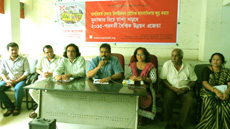 Dhaka, 22nd October 2013. Today eighteen right based civil society, labor and farmer organizations in a press conference in the capital urge government to consult and public its position on WTO (World Trade Organization) Ministerial 9 to be held during 3 to 6 December 2013 in Bali, Indonesia. The speakers in the press conference also say that WTO proposed trade in services agreement (TISA) and Agreement on Trade Facilitation (TF) in fact will jeopardize basic human rights of accessing essential public services like water, health and education and this is how it undermines post 2015 development agenda of poverty eradication and sustainable development.
Dhaka, 22nd October 2013. Today eighteen right based civil society, labor and farmer organizations in a press conference in the capital urge government to consult and public its position on WTO (World Trade Organization) Ministerial 9 to be held during 3 to 6 December 2013 in Bali, Indonesia. The speakers in the press conference also say that WTO proposed trade in services agreement (TISA) and Agreement on Trade Facilitation (TF) in fact will jeopardize basic human rights of accessing essential public services like water, health and education and this is how it undermines post 2015 development agenda of poverty eradication and sustainable development.
The press conference held in the National Press Club in Dhaka today is moderated by Mustafa Kamal Akanda of EquityBD and other speakers are Badrul Alam of Bangladesh Krishok Federation (BKF), Mohammed Ali of Bangladesh Trade Union Centre (BTUC), Sayed Jahangir Hasan Masum of Coastal Development Partnership (CDP), Shamima Akhter of ASOW. Barkat Ullah Maruf of EquityBD presents the written statement on behalf of the groups.
Other members of the groups are Jatiya Sramik Jote, Online Knowledge Society, United People Trust, Udayan Bangladesh, Unnayan Dhara Trust, Media Forum on Trade and Development, Shariatpur Development Organization, Kishani Shova, Nature Campaign Bangladesh, Bangladesh Bhumihin Shomity, VOICE, Huminity Watch and SA Foundation.
On behalf of the group Barkat Ullah Maruf says in the written statement, in fact the proposed TISA and TF will facilitate the big multinational companies of the developed countries and enhance net outflow of hard earned currencies of the developing countries and LDCs. Agreements like those two will also reduce government’s internal revenue mobilization due to import liberalization and import tariff withdrawal which, in turn, will hinder governments of LDCs to provide essential public services to its people.
Mohammed Ali, the Vice President of BTUC and railway labor leader mentions that being forced by the modalities of aids and different multilateral agreements the government is promoting corporatization in the railway of Bangladesh which has been the largest and cheapest pubic communication network in the country. WTO policies are to promote private sector and commercialization not to strengthen the public services like railway, he adds.
Badrul Alam of BKF says, agriculture is related to the food rights of common people and most fundamental one to live. So, agriculture must be separated from the WTO process.
Jahangir Hasan Masum of CDP mentions the examples of service sector liberalization in Bangladesh and how the foreign mobile companies are repatriating profit to the development countries, e.g. Grameen Phone Telenor sending money to it origin country, Norway.
Please Download [Bangla_press] [English Press] [Position paper] [Financial Express]









